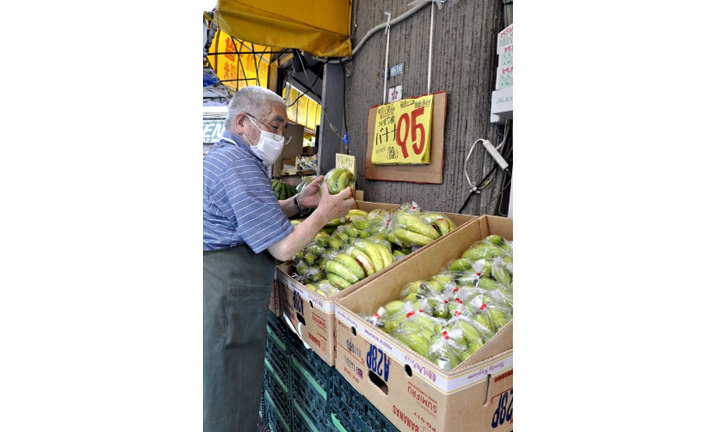SOURCE: The Yomiuri Shimbun, The Japan News
Bananas and mangoes, among other imported fruits, are in shorter supply in Japan as the coronavirus pandemic has caused lockdown-driven delays in harvesting, flight reductions and a subsequent decline in cargo volumes. This has prompted some retailers to raise the prices of such products.
In Shinjuku Ward, Tokyo, banana bunches from the Philippines were selling this week for ¥95, excluding tax, at the Shinjuku Yaoya fruit and vegetable store. The price is about ¥20 higher than in February and March.
“It is becoming more difficult to get a stock of bananas. Even if we raise the price, we make little profit from them,” said Hidetoshi Aramaki, a managing director of the company running the store.
According to the Tokyo-based Japan Banana Importers Association, imports of Philippine bananas, which account for about 80% of bananas imported to Japan, fell by about 10% in late April from the same period last year. This is because of a shortage of workers for harvesting and packing the fruit, following the Philippine government’s move to impose a lockdown mainly in metropolitan areas in mid-March to restrict people’s movement.
The wholesale price of Philippine bananas stood at ¥179 per kilogram in March, up 7% from last March and up 8% from the previous month, according to the Tokyo Metropolitan Central Wholesale Market.
Bananas grown in Ecuador, Peru and Costa Rica are expected to replace Philippine bananas, but availability from those countries has also been unstable.
A worker involved in a relevant business in Tokyo said in agony, “We can’t get enough [imported fruit] to meet the orders we’ve received.”
On the other hand, the demand for the tropical fruit is increasing due to consumers exercising self-restraint and spending more time at home. Sales of bananas at supermarkets in the Tokyo metropolitan area increased by 23% from May 1 to May 10 compared with the same period last year, after rising 18% in April.
The pandemic has also affected the procurement of products other than bananas. Showa Boeki Co., an Osaka-based importer, usually imports products such as Mexican limes and Thai mangoes by air. These are usually loaded into the cargo bellies of passenger aircraft along with the luggage.
However, the company had to reduce its lime imports from weekly to biweekly from mid-April as many airlines have either reduced or suspended their international flight services. A rise in transportation costs has increased procurement costs by about 20%.
“It has become difficult to arrange the purchase of imported products,” said a Showa Boeki official.
Nowadays, the priority in air cargo transportation is given to masks and other medical supplies. “In some cases, fruit cannot be loaded into the cargo holds along with such items,” said an official at a different company.
The volume of Mexican avocados handled at the Tokyo Metropolitan Central Wholesale Market was down by 20% in March compared with the same month last year due to the global decline in container traffic volume, pushing up the average price by 5%.
Some in the industry are concerned that shipments may decrease for lemons and cherries from the United States, which are in season from May to June, and grapefruits from South Africa.

